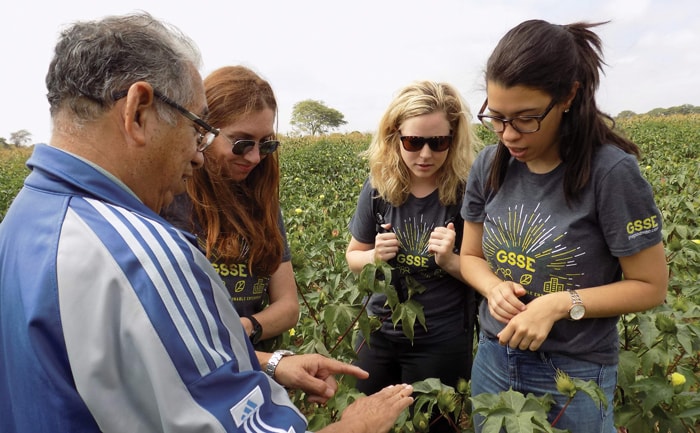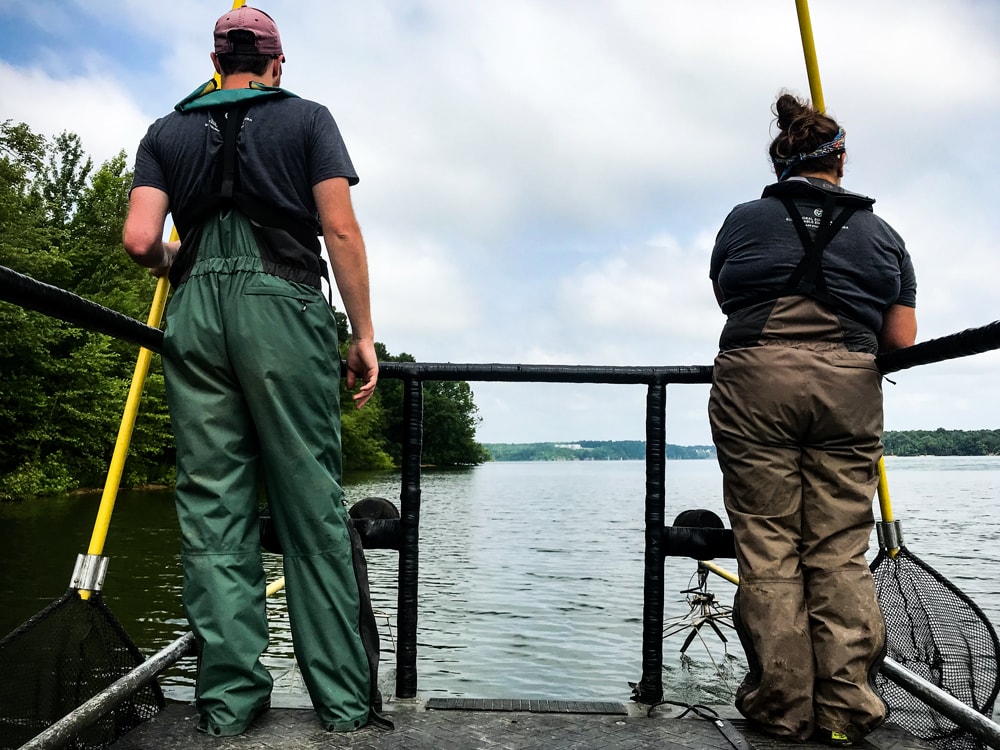Impact MBA: Empowering Leaders to Connect Purpose and Profit
Giving equal weight to people, planet, and profit has become the new standard for business performance. Spurred by BlackRock CEO Larry Fink’s 2018 letter to CEOs and policymakers declaring that companies had a responsibility to do more than make a profit, businesses are feeling the pressure to change.

Impact MBA students will experience the same hands-on instruction as students in the GSSE MBA.
But shifting operations to focus on triple-bottom-line concepts is no easy feat. One critical need is finding the right talent to help transform organizations in small and large ways – and today’s leaders are eager to acquire these skills.
To meet this market demand, the College of Business’s new Impact MBA program offers two specialized tracks: social entrepreneurship and corporate sustainability. The social entrepreneurship track, previously a part of the Global Social and Sustainable Enterprise MBA, helps students consider global concepts within an entrepreneurial context so they can learn to effectively research, establish, and operate a new social or sustainable startup business.
The new corporate sustainability track meets a growing market need for professionals embedded within organizations to drive sustainable business operations. This new track offers an “intrapreneurial” approach, empowering individuals to lead change and guide policy within existing businesses and corporations. Students learn to present solid business cases for prioritizing environmental sustainability measures and become well versed in ways to implement such measures across companies.
Already, the College of Business’s ability to train innovative graduates with a global perspective on business has earned the GSSE MBA a 2019 Innovation Roundtable Award, an annual honor given to MBA programs that excel in creating forward-thinking educational experiences. The Impact MBA builds on that award-winning program by connecting purpose with profit to implement triple-bottom-line business plans for new and established businesses alike.
Addressing the Need for Talent
The Impact MBA grew out of a need for a new kind of business professional: a multidisciplinary leader focused on changing organizations from within.
.jpg.aspx)
“With GSSE, it was difficult for us to respond to what students were interested in and develop what the companies needed,” Impact MBA Director Kat Ernst (GSSE MBA, ’08) said. “This new model creates a crossdisciplinary MBA experience that is extremely attractive to both students and organizations.”
Experiential learning is at the heart of both tracks of the new Impact MBA. Students in the social entrepreneurship track will complete a 40- to 60-day practicum in the field to research and discover gaps in knowledge around their new venture idea. In the corporate sustainability track, students will complete a 400-hour fellowship that lets them work with an existing organization on real sustainability initiatives.
“The practicum or fellowship is a significant component of this MBA,” Ernst said. “It’s what attracts a lot of students. They’re not just interested in learning the theory – they want to do the work. We build experiential learning comprehensively into the curriculum, so it’s not a standalone experience.”
This hands-on experience in a work setting gives students directly applicable expertise improving sustainability programs, strategies, and operations at firms across key industries. In light of the COVID-19 pandemic, Ernst said this kind of experiential learning is crucial to producing business leaders who can confidently and creatively respond to crises. The cross-disciplinary skills students learn in the program equip them to generate innovative solutions to challenges of all sizes, from local housing needs to global pandemics.
“The world needs our students now more than ever,” she said. “They’re already doing amazing work to support communities around the globe, and their creative approaches are especially important now.”
Alumni | Global Perspectives, Individual Impacts
Since its inception in 2007, the GSSE program has graduated 262 MBAs from 62 countries, and more than 24 percent of its graduates currently live and work outside the U.S. Alumni include Zubaida Bai, who is now creating life-saving birth kits for women in developing countries through her company ayzh, and Trang Tran, whose business, Fargreen, uses rice straw that would otherwise be burned to fertilize crops of mushrooms, preventing the release of carbon into the atmosphere.
These alumni, along with many others, have built organizations that are fulfilling life-sustaining and health-improving missions around the globe and are using their influence to improve sustainability within existing businesses.

Nobilis Aqua: A New Use for Invasive Species
Worldwide populations of many wild fish species are declining (see “Business and Biodiversity”), yet millions of ocean fish are caught each year to feed farmed fish.
This practice is negatively affecting the oceans and the species living in them. Nobilis Aqua, founded by Kelly Haugen and Erica Tardiff (both GSSE MBA, ’18), is working to address this issue. The company uses invasive fish species that damage native ecosystems to create feed for farm-raised fish, without relying on wild-caught native fish or less effective plant-based feeds typical of standard fish feeds.
“The largest point for farmers is the growth of the fish,” said Tardiff. “The shorter time that they have to house these fish, the more money they’re saving on other resources, such as electricity and water.”
Nobilis Aqua is currently focusing on sourcing Asian carp, an invasive species causing destruction in the Mississippi River and surrounding waters in the Midwest. By using these fish for feed, Nobilis is working to keep their numbers down in key areas while helping fish farmers improve growth rates with feed that has more protein and improved flavor.
Nobilis Aqua is currently focusing on sourcing Asian carp, an invasive species causing destruction in the Mississippi River and surrounding waters in the Midwest. By using these fish for feed, Nobilis is working to keep their numbers down in key areas while helping fish farmers improve growth rates with feed that has more protein and improved flavor.
Nobilis Aqua’s founders believe this approach to fish feed is viable in the long term because supplies of Asian carp are plentiful.
“Based on the studies of biologists in Illinois, 97 percent of the [fish] biomass in the Illinois River is carp. They could get that down to 20 percent, but eradication is really not a possibility,” Haugen said.
Haugen and Tardiff’s goal is to monetize the sourcing of Asian carp and other invasive species around the country. Ultimately, they believe their model will conserve aquatic biodiversity by saving wild species of fish in the oceans and improve conditions for the fish-farming industry by driving competitors to consider similar innovative and sustainable feed solutions.
"[Our students are] already doing amazing work to support communities around the globe, and their creative approaches are especially important now." – Kat Ernst, Impact MBA Director
Rubicon Global: At the Forefront of Corporate Sustainability
Rubicon Global prides itself on being a certified B Corporation committed to balancing purpose and profit. B corporations are bound to consider the impact of their business decisions on their employees, customers, suppliers, communities, and the environment. A technology company that manages waste and recycling streams for large corporate clients, Rubicon leverages data analysis to help these companies operate in a more environmentally friendly way.
Nick McCulloch (GSSE MBA, ’14), sustainability, wrote the company’s first corporate sustainability report. His work is part of Rubicon’s efforts to review results and ensure the business is making tangible changes in the industry rather than simply "greenwashing" operations for its clients.
“As consumers are becoming more discerning and discriminating, companies are being forced to talk about their sustainability performance in more credible ways,” McCulloch said. “There’s a move away from greenwashing and toward standardized corporate sustainability reporting that’s based on meaningful, credible data so that people, consumers, and investors can really look at a company, have access to their sustainability performance, and say, ‘Is this a company I want to be involved with? Is this a company I want to support?’”
McCulloch’s time at CSU gave him insights into the increased global demand for corporate sustainability. As he’s become more involved in evaluating, quantifying, and communicating sustainability opportunities, as well as implementing solutions, he has seen firsthand the inherent value that formal training in corporate sustainability can provide.
“Formal education is necessary to making the conversation increasingly sophisticated,” he said, “to move it away from greenwashing and toward calculated strategic decision-making with measurable impact.”
This includes a need for understanding how to talk to executives about tradeoffs between spending more and mitigating risk or improving reputation. McCulloch believes the Impact MBA’s corporate sustainability track will prepare more students to succeed in roles like his.
“I’m really excited that the Impact MBA program will help produce graduates who will be able to be more effective in the corporate sustainability world,” he said.
Message from the Dean
Dean Beth Walker shares the College of Business's mission, vision, and five-year strategic goals.
Experience Mosaic
Mosaic, the College's "Room of the Future," is the next evolution in online education.
Business and Biodiversity
College of Business faculty members Tom Dean and John Macdonald discuss how business can preserve Earth's biodiversity – and why it should.